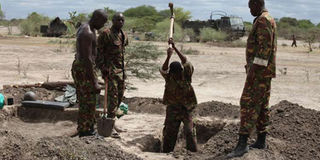Few days in Afmadhow: Lessons in courage from KDF soldiers’ sacrifices on the war front

Soldiers prepare an underground sleeping space at one of the forward operating bases in Afmadhow, Somalia. The soldiers spent their nights literally burrowed in shallow holes in the ground with only a sleeping bag to ward off the cold. PHOTO | MURITHI MUTIGA | NATION MEDIA GROUP
What you need to know:
- The soldiers maintained high spirits despite the tough life far from home and only really got emotional when they discussed battles in which colleagues had been killed.
- At that time, the Kenyans were praised for having some of the best defensive fortifications of any of the forces in the theatre in Somalia.
- But having travelled to Afmadhow as just another busybody, keyboard warrior and critic of the military, I left the place with a keen admiration of the ordinary soldier in the trenches.
What happens if it rains? The soldiers smiled when one of the reporters posed this question after being showed the sleeping arrangements at the temporary Kenyan military camp in the southern Somalia town of Afmadhow.
The soldiers spent their nights literally burrowed in shallow holes in the ground with only a sleeping bag to ward off the cold.
Staying anywhere above ground – unless it was in one of the Armoured Personnel Carriers – would expose them to fire from the Rocket Propelled Grenades which were a favourite Al-Shabaab weapon and which the militants fired in virtually every night.
“Well,” said Major Emmanuel Kaliakamur in response to the reporter’s question. “When it rains, the best idea is to remain in the same position and the sleeping bag will stay warm. If you turn even once the water will be everywhere and your night will be over.”
The soldiers took turns on guard duty and every night, small bands of seemingly suicidal militants would attack, disturb the trip wire at the edge of the camp which would light up the sky like fireworks and the attackers would often be killed by the sentries.
The abiding memory of that time with the soldiers, though, was not their fights with the Shabaab but simply the shock of how hard daily life is in a harsh, unforgiving land at the front and how relaxed soldiers were in the face of all these challenges.
One morning, the Shabaab fired into the camp at the crack of dawn.
One of the soldiers was taking a shower in a makeshift bathroom and his reaction was, simply: “Aaargh! Why do these Shabaabs always start playing their music when I have just soaped my hair?”
BOLD DURING WAR
Maybe because their training prepares them to face extreme danger, soldiers have a way of taking everything in their stride and rationalising a task which would break most normal men.
The stories they shared during the day left one feeling a bit off balance.
One of the lieutenants merrily recalled the day a long black mamba sneaked into his sleeping bag to share the warmth of the soldier for the night.
In the morning, when the affected guy spotted his unwanted visitor, he had the presence of mind to lie still, defying the early morning call, until the snake slithered out and could be killed a safe distance away from his body.
Dinner was taken well before sunset to prepare for the long hours of waiting for Shabaab attacks at night with every meal consisting of ugali and beef from cows sold by the locals, accompanied by the fresh fruit which abounds in the fertile farms of that locality and some “Afmadhow water,” the misty, salty liquid that comes forth from local boreholes and resembles more coconut juice than regular water.
The soldiers maintained high spirits despite the tough life far from home and only really got emotional when they discussed battles in which colleagues had been killed.
At that time, the Kenyans were praised for having some of the best defensive fortifications of any of the forces in the theatre in Somalia.
The problem with confronting militants, though, is summed up in this statement issued by Irish paramilitaries after they narrowly failed in an assassination attempt against Margaret Thatcher in 1984: Today we were unlucky, but remember we only have to be lucky once and you have to be lucky always.
APPRECIATE OUR HEROES
The Shabaab have failed in previous major attacks on Kenyan military camps notably in Bardhere and in Lamu.
On Friday morning, they got lucky.
There will be a time to assess the geopolitics of the conflict, its wisdom and the whole situation in Somalia.
But having travelled to Afmadhow as just another busybody, keyboard warrior and critic of the military, I left the place with a keen admiration of the ordinary soldier in the trenches.
The loss of numerous men in battle is always a tough thing to take.
There will be a reckoning about how this was allowed to happen and about the general mission in Somalia.
But it is possible, at least while wounds are fresh, simply to appreciate the sacrifices these young men across ethnic and religious divides make for their country.
Murithi Mutiga is the Special Projects Editor, Sunday Nation. [email protected]





